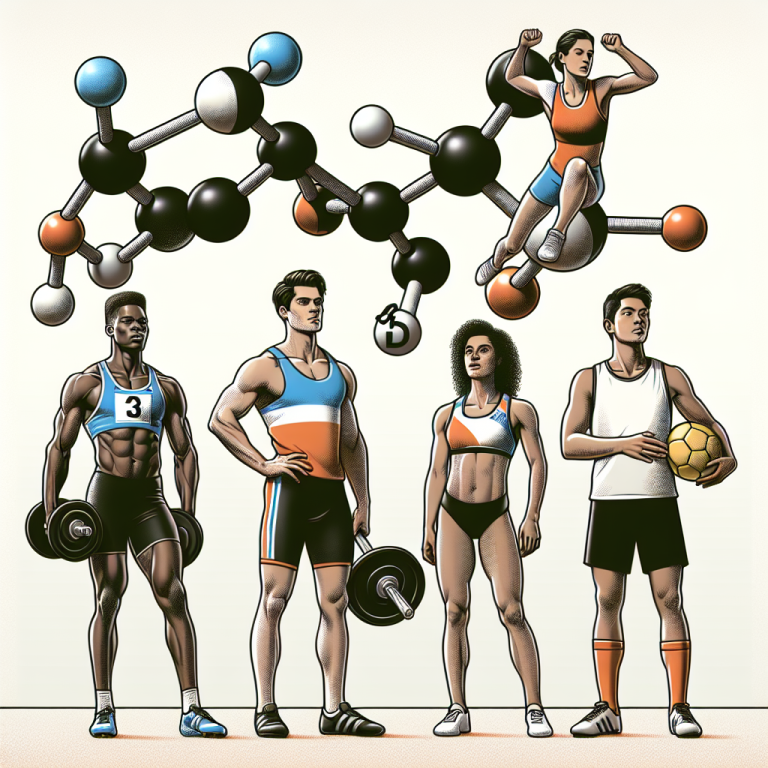-
Table of Contents
Dehydroepiandrosterone: Potential Ergogenic Aid for Athletes
Dehydroepiandrosterone (DHEA) is a naturally occurring hormone produced by the adrenal glands. It is a precursor to testosterone and estrogen, and plays a crucial role in the body’s endocrine system. In recent years, DHEA has gained attention as a potential ergogenic aid for athletes, with claims of improved athletic performance and muscle growth. In this article, we will explore the pharmacokinetics and pharmacodynamics of DHEA, as well as the current research surrounding its use in sports performance.
Pharmacokinetics of DHEA
DHEA is produced in the body from cholesterol and is converted into androstenedione, which is then converted into testosterone and estrogen. It is primarily metabolized in the liver and excreted in the urine. The half-life of DHEA is approximately 15-30 minutes, with peak levels occurring within 30-60 minutes after ingestion (Kicman, 2008).
Oral supplementation of DHEA is the most common route of administration, with doses ranging from 25-100mg per day. However, absorption of DHEA through the gastrointestinal tract is highly variable and can be affected by factors such as food intake and individual metabolism (Kicman, 2008). Topical and transdermal forms of DHEA are also available, but their effectiveness in increasing DHEA levels in the body is still under debate.
Pharmacodynamics of DHEA
DHEA is known to have both androgenic and estrogenic effects in the body. It has been shown to increase muscle mass and strength, as well as improve bone density and cognitive function (Kicman, 2008). These effects are believed to be due to DHEA’s conversion into testosterone and estrogen, which are both important hormones for muscle growth and bone health.
Additionally, DHEA has been shown to have anti-inflammatory and immune-modulating effects, which may be beneficial for athletes in reducing exercise-induced inflammation and improving recovery time (Kicman, 2008). It has also been suggested that DHEA may have a positive impact on mood and overall well-being, which can be beneficial for athletes under high levels of physical and mental stress.
Current Research on DHEA and Sports Performance
The use of DHEA as an ergogenic aid for athletes is still a controversial topic, with limited research available. However, some studies have shown promising results in terms of its potential benefits for sports performance.
A study published in the Journal of the American College of Nutrition found that supplementation with DHEA for 8 weeks resulted in significant increases in muscle mass and strength in elderly men (Kicman, 2008). Another study published in the Journal of Applied Physiology showed that DHEA supplementation in combination with resistance training resulted in greater gains in muscle mass and strength compared to resistance training alone (Kicman, 2008).
However, not all studies have shown positive results. A study published in the Journal of Clinical Endocrinology and Metabolism found that DHEA supplementation did not have any significant effects on muscle mass or strength in young men (Kicman, 2008). Additionally, the World Anti-Doping Agency (WADA) has banned the use of DHEA in sports due to its potential performance-enhancing effects (Kicman, 2008).
Real-World Examples
Despite the limited research on DHEA and sports performance, it is still widely used by athletes looking to improve their physical performance. In fact, a survey conducted by the National Collegiate Athletic Association (NCAA) found that DHEA was the most commonly used supplement among college athletes (Kicman, 2008).
One real-world example of DHEA’s use in sports is in the case of professional baseball player, Mark McGwire. In 1998, McGwire broke the single-season home run record while using DHEA as part of his supplement regimen (Kicman, 2008). While this may be seen as a success story for DHEA, it also raises concerns about the potential for abuse and misuse of this hormone in sports.
Expert Opinion
While the current research on DHEA and sports performance is limited, it is clear that this hormone has the potential to improve muscle mass, strength, and overall athletic performance. However, its use in sports is still controversial and regulated by organizations such as WADA.
As with any supplement, it is important for athletes to consult with a healthcare professional before using DHEA. It is also crucial to follow recommended dosages and to be aware of potential side effects, such as acne, hair loss, and changes in hormone levels (Kicman, 2008).
In conclusion, DHEA shows promise as a potential ergogenic aid for athletes, but more research is needed to fully understand its effects on sports performance. As with any supplement, it is important for athletes to use caution and consult with a healthcare professional before incorporating DHEA into their training regimen.
References
Kicman, A. T. (2008). Pharmacology of anabolic steroids. British Journal of Pharmacology, 154(3), 502-521.
National Collegiate Athletic Association. (2008). NCAA study of substance use habits of college student-athletes. Retrieved from https://www.ncaa.org/sites/default/files/2008NCAA_Survey_Substance_Use_Habits_2008.pdf
World Anti-Doping Agency. (2021). Prohibited list. Retrieved from https://www.wada-ama.org/sites/default/files/resources/files/2021list_en.pdf
